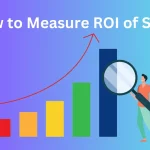SEO – Search Engine Optimization is a long term digital marketing technique. It requires a long time and investment. So, it is very important to measure the SEO success. In this context, our focus is on measuring SEO success: Key metrics and analytics tools.
Let’s jump into the deep:
Why Measuring SEO Success is Important?
Measuring SEO (Search Engine Optimization) success is crucial for several reasons, as it provides valuable insights into the effectiveness of your online presence and the impact of your SEO efforts. Here are detailed explanations of why measuring SEO success is important:
Quantifying ROI (Return on Investment):
Explanation: Businesses invest time, resources, and money in SEO strategies to improve their online visibility. Measuring success allows you to assess the return on that investment.
Importance: Understanding the ROI helps justify SEO expenses and optimize strategies for better results.
Understanding Website Performance:
Explanation: SEO metrics, such as organic traffic, keyword rankings, and conversion rates, provide a comprehensive view of how well your website is performing in search engine results.
Importance: Identifying areas of improvement helps enhance the overall user experience, leading to increased user satisfaction and engagement.
Monitoring User Behavior:
Explanation: Analytics tools provide insights into user behavior, including which pages they visit, how long they stay, and whether they convert.
Importance: Understanding user behavior helps refine content, design, and navigation to better meet the needs of your audience.
Optimizing Content Strategy:
Explanation: By analyzing keyword rankings, click-through rates, and content engagement, you can determine which topics and types of content resonate most with your audience.
Importance: This information guides the creation of relevant and valuable content, aligning with user intent and search engine algorithms.
Identifying Technical Issues:
Explanation: SEO metrics can reveal technical issues that may impact website performance, such as slow page load times, crawl errors, or issues with mobile responsiveness.
Importance: Addressing technical issues improves the site’s overall health and ensures optimal visibility in search results.
Competitor Analysis:
Explanation: Measuring SEO success involves monitoring how your website compares to competitors in terms of keyword rankings, backlinks, and overall online presence.
Importance: Understanding competitive landscapes helps identify opportunities, assess market trends, and refine strategies to stay ahead.
Ensuring Alignment with Business Goals:
Explanation: SEO efforts should align with broader business objectives, such as increasing sales, generating leads, or building brand awareness.
Importance: Measuring SEO success allows you to evaluate whether your strategies contribute to achieving these overarching business goals.
Adapting to Algorithm Changes:
Explanation: Search engines regularly update their algorithms. Measuring SEO success helps you stay informed about how algorithm changes impact your rankings and traffic.
Importance: Adapting strategies based on algorithm updates ensures that your website remains optimized and visible in search results.
Proving the Value of SEO to Stakeholders:
Explanation: Measuring and reporting on key SEO metrics provides tangible evidence of the impact of SEO efforts to stakeholders, such as executives, clients, or team members.
Importance: Demonstrating success fosters trust and support for ongoing SEO initiatives.
How to Measure SEO Success
Measuring SEO success involves tracking various metrics to evaluate the effectiveness of your search engine optimization efforts. Here’s a detailed guide on how to measure SEO success:
Keyword Rankings:
Monitor the rankings of your target keywords on search engine results pages (SERPs). Tools like Google Search Console, SEMrush, or Ahrefs can provide insights into keyword positions over time.
Organic Traffic:
Analyze the overall organic traffic to your website. Tools like Google Analytics offer detailed information on the number of visitors who find your site through organic search.
Conversion Rates:
Track the conversion rates for organic traffic. Measure the percentage of visitors who complete desired actions, such as making a purchase, filling out a form, or subscribing to a newsletter.
Bounce Rate:
Monitor the bounce rate for organic traffic. A high bounce rate may indicate that visitors aren’t finding what they’re looking for, so optimizing content and improving user experience can help reduce it.
Click-Through Rate (CTR):
Evaluate the click-through rates of your organic listings in search results. Higher CTRs suggest that your titles and meta descriptions are compelling and relevant to users.
Backlink Profile:
Assess the quality and quantity of backlinks to your website. Tools like Ahrefs, Majestic, or Moz can help you analyze your backlink profile and identify opportunities for improvement.
Domain Authority and Page Authority:
Track the Domain Authority (DA) and Page Authority (PA) of your website. These metrics, often provided by tools like Moz, indicate the overall and page-specific strength of your site in search engines.
Pages Per Session:
Analyze the average number of pages viewed per session by organic traffic. Higher numbers suggest that visitors are exploring multiple pages, indicating a positive user experience.
Time on Site:
Measure the average time users spend on your site from organic search. Increased time on site can be a sign of engaging and relevant content.
Indexed Pages:
Check the number of pages from your site that are indexed by search engines. This can be monitored through Google Search Console. Ensure that all essential pages are indexed.
Local SEO Metrics:
For businesses with a local presence, track metrics like local search rankings, Google My Business (GMB) performance, and customer reviews. Local SEO success is crucial for businesses targeting a specific geographic area.
Mobile Responsiveness:
Assess how well your website performs on mobile devices. With the increasing importance of mobile-friendly experiences, ensure that your site is responsive, and monitor mobile search traffic.
Page Load Speed:
Check the loading speed of your web pages, as it can impact both user experience and search rankings. Tools like Google PageSpeed Insights can provide recommendations for improvement.
Revenue and ROI:
Ultimately, tie your SEO efforts to revenue. Monitor the impact of SEO on sales, leads, or other key performance indicators (KPIs) that align with your business goals. Calculate the return on investment (ROI) for your SEO activities.
Competitor Analysis:
Compare your SEO performance with that of your competitors. Analyze their rankings, backlink profiles, and overall online presence to identify areas for improvement.
Monitor Algorithm Updates:
Stay informed about major search engine algorithm updates. If you experience significant changes in rankings or traffic, it’s essential to investigate whether they align with algorithm updates.
Remember that SEO is an ongoing process, and success is often measured over the long term. Regularly assess these metrics, adjust your strategy based on performance, and adapt to changes in search engine algorithms or industry trends.
Also Read
What are The Key Matrix and Analytics Tools for Measuring SEO Success
Measuring SEO success involves tracking various metrics and using analytics tools to gain insights into the performance of your website and its visibility on search engines. Here are some key matrices and analytics tools for measuring SEO success:
Key Metrics for Measuring SEO Success:
Organic Traffic:
Definition: The number of visitors who reach your site through organic (non-paid) search results.
Importance: Indicates the effectiveness of your SEO efforts in improving search engine visibility.
Keyword Rankings:
Definition: The position of your website for specific keywords in search engine results pages (SERPs).
Importance: Helps assess the success of your keyword optimization strategy.
Click-Through Rate (CTR):
Definition: The percentage of users who click on your website link in the search results after seeing it.
Importance: Reflects the relevance and attractiveness of your meta titles and descriptions.
Bounce Rate:
Definition: The percentage of visitors who leave your site without interacting with it.
Importance: High bounce rates may indicate irrelevant content or a poor user experience.
Conversion Rate:
Definition: The percentage of visitors who take a desired action, such as making a purchase or filling out a form.
Importance: Indicates the effectiveness of your website in converting visitors into customers or leads.
Page Load Speed:
Definition: The time it takes for your web pages to load.
Importance: Google considers page speed as a ranking factor, and faster-loading pages contribute to a better user experience.
Analytics Tools for Measuring SEO Success:
Google Analytics:
Features: Provides detailed insights into website traffic, user behavior, and conversions.
Benefits: Tracks organic traffic, user engagement, and conversion metrics.
Google Search Console:
Features: Offers information on how Googlebot views your site, identifies crawl issues, and provides data on search queries.
Benefits: Helps monitor keyword rankings, identify indexing issues, and submit sitemaps.
SEMrush:
Features: Offers a suite of SEO tools, including keyword research, competitor analysis, and site audit.
Benefits: Helps track keyword positions, analyze backlinks, and identify opportunities for improvement.
Ahrefs:
Features: Focuses on backlink analysis, keyword research, and competitor tracking.
Benefits: Assists in monitoring backlinks, discovering new keyword opportunities, and evaluating competitor strategies.
Moz:
Features: Provides tools for keyword research, link building, and site audits.
Benefits: Helps track keyword rankings, assess on-page SEO, and monitor link profiles.
Rank Ranger:
Features: Offers a range of SEO tools, including rank tracking, site audits, and competitor analysis.
Benefits: Allows you to monitor keyword rankings, track SERP features, and analyze competitor performance.
By regularly monitoring these key metrics using the mentioned analytics tools, you can gain valuable insights into the performance of your SEO strategy and make data-driven decisions to improve your website’s search engine visibility and overall success.
Also Read
End Words
Measuring SEO success is vital for optimizing strategies, improving website performance, and aligning efforts with overarching business goals. It allows you to adapt to changes in the digital landscape, demonstrate the value of SEO, and continuously enhance your online presence for long-term success.







